Bitcoin is a decentralized digital currency which works without an administrator or a central bank. While still a debatable implementation, monetary dealings have found a new and more convenient meaning due to purchases being carried out through digital transactions. With the administration of this concept, money need not be carried around physically. Bitcoin is now back in headlines after ascending in value. It was worth $2800 on May 25, up from $1200 at the end of April. The Bitcoin administration is organized through a network known as the blockchain. It is essentially an online ledger that maintains a secure record of each transaction. With each Bitcoin dealing, the swap gets logged. These blocks aren’t externally supervised by anyone. It is decentralized across each computer that has a bitcoin wallet. Bitcoin has commendable transactional properties such as:
The Bitcoin administration is organized through a network known as the blockchain. It is essentially an online ledger that maintains a secure record of each transaction. With each Bitcoin dealing, the swap gets logged. These blocks aren’t externally supervised by anyone. It is decentralized across each computer that has a bitcoin wallet. Bitcoin has commendable transactional properties such as:
PSEUDONYMOUS – The transactions and accounts are not connected to real world entities. Bitcoins are received on address chains of about 30 characters. While it can help trace the flow of transaction, it is challenging to connect addresses to real world users.
FAST AND GLOBAL – Transactions are implemented instantly with a confirmation in a couple of minutes. The concept is completely indifferent of the user’s physical location owing to its global network.
SECURITY – Cryptocurrency dealings are locked in a public key cryptography system. It is nearly impossible to retrieve information from chains of encrypted numbers making it a reliable and secure form of transaction.
NO PERMISSION – Cryptocurrency isn’t monitored by anyone. It is a software people can download and use free of cost. Not set criteria is required for the adoption of this concept. Bitcoins aims to be a quicker, cheaper and more reliable form of payment than money tied to individual countries. It promises enhanced security equipped with a complicated hexadecimal ID that makes it exponentially more challenging to crack than credit card information. However, credit card dealings can be reverted but the same isn’t possible with a Bitcoin transaction. This makes it more susceptible to fraudulent scenarios and illegal negotiations.
Bitcoins aims to be a quicker, cheaper and more reliable form of payment than money tied to individual countries. It promises enhanced security equipped with a complicated hexadecimal ID that makes it exponentially more challenging to crack than credit card information. However, credit card dealings can be reverted but the same isn’t possible with a Bitcoin transaction. This makes it more susceptible to fraudulent scenarios and illegal negotiations.
A finite number of 21 million bitcoins exist. Every four years, the number of bitcoins released relative to the previous cycle gets cut in half resulting in the circulation approaching 21 million but never touching the peak. The reward to miners, which stands at 12.5 bitcoins also gets reduced by half, hence isolating bitcoin from inflation. However, a potential hack could be catastrophic to the future of bitcoin resulting in the draining people’s wallets with no promise of reimbursement.
 Cryptocurrency could possibly indicate the establishment of a new economy. It is a rapidly evolving market with significant exchange of various cryptocurrencies by the day. Bitcoin, the most popular form of cryptocurrency is making headlines with its increasing transaction volume of more than 200.000 daily. The history of bitcoin has been extremely volatile but it has been having significant changes lately. The plunge of bitcoin by 50% in 2018 highlights the fluctuating nature of this concept. However, Jeremy Lieu, Snapchat’s first investor predicts that it will hit $500,000 by 2030. This concept is here to stay with dreams of changing our perspective on economy as we know it. Fundamentally, the future of this concept lies in its ability to balance convenience and its connection to the real world. Could cryptocurrency indicate the awakening of a new economy?
Cryptocurrency could possibly indicate the establishment of a new economy. It is a rapidly evolving market with significant exchange of various cryptocurrencies by the day. Bitcoin, the most popular form of cryptocurrency is making headlines with its increasing transaction volume of more than 200.000 daily. The history of bitcoin has been extremely volatile but it has been having significant changes lately. The plunge of bitcoin by 50% in 2018 highlights the fluctuating nature of this concept. However, Jeremy Lieu, Snapchat’s first investor predicts that it will hit $500,000 by 2030. This concept is here to stay with dreams of changing our perspective on economy as we know it. Fundamentally, the future of this concept lies in its ability to balance convenience and its connection to the real world. Could cryptocurrency indicate the awakening of a new economy?



Enjoyed reading the article above , really explains everything in detail